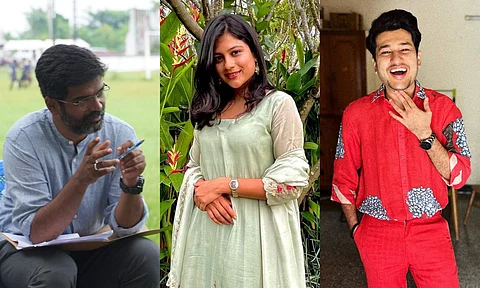

The influence of objects in our lives has played a crucial step in our evolution as the dominant species on Earth. So naturally, it is seen as quintessentially human behaviour to have a personal, emotional connection with the things we interact with on a daily basis. Finding an old pen from our school days, chancing upon an old photo, and a random curio that vaguely reminds you of that one person you used to know, could open a floodgate of emotions and memories.
While our relationship with objects is as ancient as the art of storytelling, an ambitious confluence of both of these things: SonyLIV’s original anthology webseries Story of Things, tries to push this object-human relationship to the edge of the unknown, to the paranormal, and to the limits of known human psychology. While the series stars many known faces, we sat down with writer-director George K Antoney, and actors Aditi Balan and Roju to talk about the series.
Since mainstream storytelling seldom forays into deep explorations of such quirky ideas with psychological undertones, one feels compelled to ask the series creator George K Antoney how he started conceiving this project. Interestingly, the answer came from actor Roju who light-heartedly recalled a conversation between George and their mutual friend. He says, “One of our friends jokingly said that his noisy air conditioner sounded like it was talking to him and George just explored that idea further.” Taking the reins of the conversation, George says, “I wanted to explore different human emotions through this idea. So, I wrote my stories first and then incorporated this idea of using an object as a tool to write each episode.” George then laid bare the anthropological foundations of this idea by saying, “We have this general inclination to ascribe human emotions to the objects around us. Even through a historical lens, we could see how different cultures are emotionally attached to different inanimate things like rivers and hills and consider them as living beings. Even religion is like that.” The team nods in agreement. He continues, “Conceptually, this is called Animism and there is also a playful term called Resistentialism where you think an object is intentionally misbehaving with you.” George goes on to recall how such an idea was humorously explored in Rajinikanth’s Padikkadavan(1985) where his Taxi(Lakshmi) would refuse to start whenever it disagreed with his actions. He sums it up by saying, “I used each object as a metaphor for telling the story that I wanted to tell. There is a novel called Wolf Totem by Jiang Rong which also served as an influence”. Aditi Balan interjects by confessing that she liked the overall idea. "Even in my segment, there is a nice psychological element to it all."
Incidentally, this is the first time the OTT specialist Roju is playing the lead in a story not written by him. Talking about his transition from being a writer-director to an actor, Roju says, “I never positioned myself as an actor, When I worked in director Rathnakumar’s Aadai(2019), I’ll suggest technical inputs to my cinematographer Vijay Kartik, since I have an inclination to that craft. I functioned more as a technician on set. My primary objective while working on other projects is to see what I can steal from there, and to see what I can learn as a director,” He then turns towards George to say, “As far as learning is concerned, I look at George as a gold mine. I’ve done a lot of writing but I have not practised shooting it a lot. Since George’s background is in advertisement, he has directed a lot. He’s primarily a director, and it is a skill I’m inculcating slowly.”
Roju then talks about his episode in the series (Compressor) and how George’s reverence towards Steven Spielberg could be seen in it. He says, “Compressor is more of a form exploration than a plot-heavy story. You could liken it to Spielberg’s Duel (1971). In mood, we tried to capture Rosemary’s Baby (1968) but as a structure, we tried emulating Duel. The film, if you remember, entirely revolves around a truck chase and it still ends up being so engaging. I don’t see many filmmakers here who could pull that off. I might sound partial but the closest film that got to that mood is Compressor.”
Aditi Balan, who shot to fame with the critically acclaimed Aruvi (2016), opened up about being typecast in serious roles. When asked how she plans to change that she playfully answers, “My plan to change that is by pointing it out in every interview like this,” laughs Aditi, who further explains about the roles she wishes to explore in her career. “I would like to do more comedic, light-hearted, and romantic films. When you think about it, even in romantic films when two lovers fight, it's bound to get serious but there is a different dimension to that seriousness when compared to the roles I'm getting. I feel like I'm being boxed into serious roles."
Keeping in tone with the theme of the series, when asked about what object she emotionally connects with the most, Aditi being the actor that she is, says, "Camera. It would be interesting if they could talk."